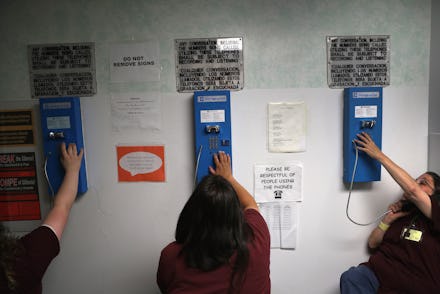Incarcerated deaf people need a way to reach the outside world, but no one is listening

Anyone who hates their service with a company like AT&T or Verizon should get a load of Securus, Global Tel Link and Telmate — the telecoms of America's prisons. With monopolistic contracts, these companies keep the costs of staying in touch with an incarcerated loved one high.
But as expensive and arduous it is for inmates to lean on their families for support, deaf inmates have it far worse. Incarcerated deaf people require special technology to communicate with the outside world, and that technology is often too expensive, outdated or in disrepair.
The current requirement from the FCC is that prisons offer access to a "TTY" service. That's short for teletypewriters, clackety electronic keyboards first invented in the 1960's.
To begin, these systems are often outdated, aging on storeroom shelves or broken without any guards or wardens who know how to use them. A survey by a group called Helping Educate to Advance the Rights of the Deaf, or HEARD, found that only 19% of deaf inmates have access to TTY systems in "good working condition."
But TTYs are also just outdated. The deaf community has largely moved on to video relay screens, or VRS, a system that allows deaf prisoners to sign on camera to an interpreter, who reads out the English to whoever they're calling.
"Many deaf people grow up using American Sign Language and their first language, and have to rigorously learn English," Scott Huffman, an activist who does field work for HEARD, said. "So their preferred mode of communication is sign language."
Innocent families paying criminal charges
Making phone calls is already prohibitively expensive — at one point, only a few years ago, it could cost over a dollar a minute, even to people in county jails that hadn't been found guilty. For the 2.3 million people behind bars in the U.S., a full third of their families are going into debt just to cover communication costs, and 87% of the people paying those costs are women (who are often raising children).
In order to bring those costs down, the FCC tried capping the rates to 11 cents a minute, but the prison telecoms sued until the FCC found a higher compromise.
To Talila Lewis, the founder and executive director of HEARD, the fear of more lawsuits is the leading theory for why the FCC doesn't issue a broad demand that facilities update to the newer VRS systems. VRS could be seen as a threatening product to video visitation, an expensive Skype-like video calling system that prison telecoms are selling as the new frontier of prison visits.
Part of the struggle for Lewis to get attention to this problem is that nobody knows how big the problem is. The prison system has no idea how many of its inmates are deaf, or where its deaf inmates end up. HEARD keeps the only database of deaf prisoners and their whereabouts, but can only track the deaf through tips from advocates and inmates. Lewis' lowest tenable estimate is 1% — or about 23,000 inmates among the nation's 2.3 million — but Lewis suspects there may be many times that number.
Because jails still rely on teletype machines, these costs are far worse for deaf inmates. TTY calls take longer and can be full of clerical errors.
"It takes a deaf person three times as long as other people to make those calls," Huffman said. "So you have deaf people paying $700, $800 a month just to talk to their husband or wife."
One jail at a time
In Lewis' ideal world, the FCC would raise the standards for accessibility in prisons for deaf inmates who, for example, would have a hard time accessing sexual abuse hotlines and other services available to prisoners who can more freely make calls to the outside world.
There are a slew of landmark laws that should protect deaf prisoners — the Rehabilitation Act of 1973, the Americans with Disabilities Act of 1990 and the Telecommunications Act of 1996 among them. Even FCC representative Mark Wigfield acknowledged to Mic via email, "the facilities themselves may be subject to requirements under the Americans with Disabilities Act."
So Scott Huffman is putting heat on the jails one by one, educating wardens and local sheriffs about the importance of setting up video systems. And the jails and prisons are excited to install state-of-the-art VRS systems as soon as Huffman tells them one of the FCC's best-kept secrets: the systems are free.
For facilities that need modern video relay screens, the federal government will cover the costs of installation and all of the calls made. The prison telecoms might not appreciate the competition, but it would provide a necessary lifeline to disabled incarcerated people who need it.
"It's unconscionable that we haven't figured out to make sure that all systems are accessible, when we're asking for videophones that cost nothing," Lewis said.
Correction: Sept. 6, 2016